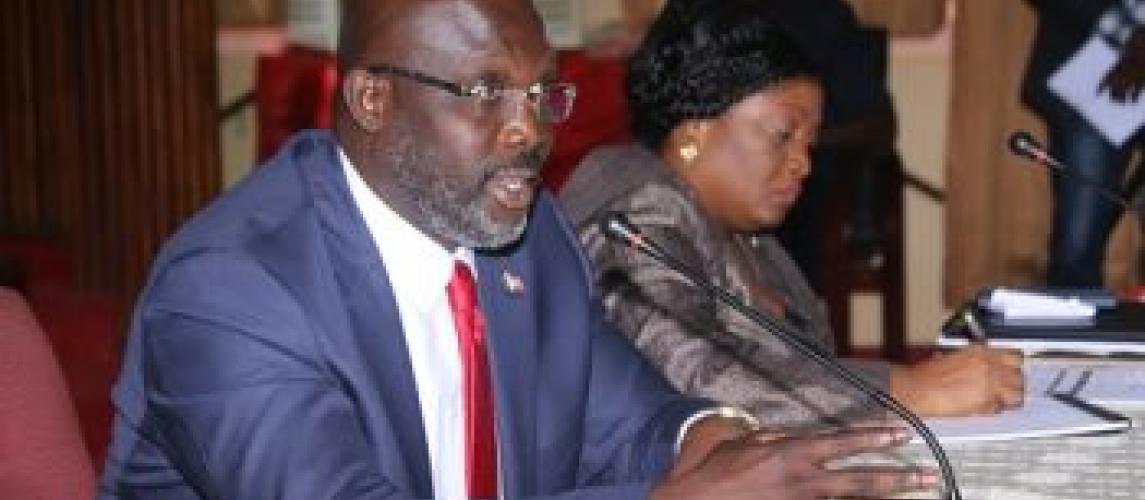
President Weah’s Critical Pro-Poor Projects To Be Executed in Three To Four Months
Monrovia, Liberia - President Weah’s Critical Pro-Poor Projects To Be Executed in Three To Four Months
PROJECTS SUMMARIES
Pillar One - Education and Training
ü Pay Junior and Senior High School Examination Fees for public and private schools
Every child, no matter the family’s status, should have access to quality education. This project will absorb the West African Examination Council (WAEC) and West African Senior School Certificate Examination (WASSCE) fees for students sitting the exams. 9th graders fees are already paid for by government. So the estimated cost is based on an anticipated twelve percent increase from 2017 to 2018 to approximately 35,000 12th graders from both public and private schools.
ü Provision of digital registration system for the University of Liberia and free Wi-Fi internet for students at the main campus
Students of the public universities have experienced hurdles during registration due to the manual nature of the current registration procedures. This project will relax the hurdles that have continuously frustrated students at the University of Liberia, which normally leads to confusion and mass demonstrations. This digital registration system, supported by a Wi-Fi internet environment on the main campus will significantly minimize the complications and turnaround time for registration and also improve research capacity.
ü Fulfill government obligation by paying the salaries of 400 new teachers and correcting the salaries of 180 underpaid personnel
Well-trained teachers should be strategically located throughout the various counties; currently, there are over 6,000 vacant teacher positions in Liberia. This project takes a step towards closing the educational gap by making targeted improvements to staffing of the Education sector in this fiscal year. Firstly, the government will follow through with a government commitment to complete 400 Personnel Action Notices (PANs) for Partnership Schools for Liberia (PSL) teachers. Secondly, the salaries of 180 currently underpaid staff due to historic reasons will be paid.
ü Increase the number of local Liberian experts through professional skills development for key technical positions in government
This project will increase the number of Liberians with specialized technical skills, allowing them to fill important gaps for technicians in Liberia. Key technical positions, such as computer programmer and technicians, for government systems such as ASYCUDA will be identified and trained. Within the health sector, new generation of Liberians will be trained as pathologists, anesthesiologists, toxicologists, and other medical specialists and technologists.
ü Provide beds, tools, and other medical equipment and facilities upgrades for John F. Kennedy Medical Center
The John F. Kennedy Medical Center (JFK) in Monrovia was originally constructed in 1961 and the facilities require significant refurbishment. In the short-term, beds, tools, and equipment are necessary for services to continue as required.
ü Support on-going humanitarian outreach programs by the First Lady
Physically Challenges and Senior Citizens - The Office of the First Lady is committed to delivering quick impact through projects that reach marginalized members of society across Liberia.
Pillar Two – Economy, Jobs and Infrastructure Development
ü Repair and maintain traffic lights in Monrovia and construct 400 new street lights along the Roberts Field Highway
This project will repair, refurbish, and otherwise maintain traffic lights in Monrovia and provide 400 solar-powered street lights along the Roberts Field Highway to help improve community and road safety.
ü Maintain the Ganta to Zwedru road to prevent deterioration during the rainy season
Prioritizes the maintenance of roads during the rainy season is important so that resources are made available through the Ganta to Zwedru road corridor. This project is for short-term impact, but in the long-run, the road shall be fundamentally strengthened further.
ü Fulfill government obligation and contribution to the Sanniquellie to Loguatuo Road
Governments must follow through with their commitments. In 2016, the government committed to counterpart funding for two roads, the Sanniquellie to Logatuo Road, and the Fish Town to Kilipo Road. Part of this project involves payment for the Resettlement Action Plan (RAP) which has already been completed by the Environmental Team in the Ministry of Public Works. This is a much necessary step to continue road construction.
ü Repair and maintain damaged NTA buses
The existing fleet of NTA buses is in need of repair to improve transportation systems in the country.
This project will promote The Liberian Owned and Operated Businesses through a government-backed credit line to stimulate private sector development. Historically, loan defaulting has become a major impediment to the provision of loans to Liberian owned businesses.
ü Introducing non-discriminatory loan and grant facilities will provide empowerment and support for Liberian-owned businesses.
This project establishes a government-backed credit line program of at least US$1,000,000 to extend loans to new and existing businesses. These efforts will support entrepreneurs within the private sector as a means of reducing poverty, increasing employment, and increasing Liberians’ participation in the economy.
This loan scheme will be jointly owned and managed by the government and a lending partner to mitigate the risk of default while achieving the government’s goal of strengthening the private sector through rigorous due diligence and monitoring measures.
ü Conduct feasibility study for new Military Hospital
Pillar Three - Sustainable Peace, Security and National Defense
ü This project will hire a specialist firm to deliver options for the design and construction of the military hospital announced as a presidential initiative.
Pillar Four - Accountability and Anti-Corruption
ü Finance efforts to issue biometric identification to government employees and rationalize the wage bill through payroll verification
ü The Liberian National Identification Registry, having been established, plays a vital role in verifying the existence of civil servants in government using a combination of identification cards and biometric systems. The government expects to make savings over US$20,000,000 from rationalizing the wage bill and payroll verification.
